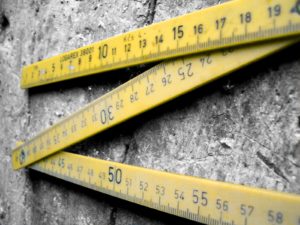
Measuring Sticks
Do you remember Mary Poppins’ measuring tape? When she measures Michael, it reads “Rather Stubborn and Suspicious” and when she measures Jane, it reads “Inclined to Giggle Doesn’t put things away.” And what does it say when she measures herself? “Practically Perfect in Every Way.”
Clients come in to therapy with their own measuring sticks – and based on their own histories, experiences, biases, fears, hopes, etc. – they have a tendency to believe that their measuring stick is the RIGHT measuring stick. They’re quick to assume that their memory of the last argument, their assumption about their partner’s (or boss’ or kids’) intention, their prediction of the future is practically perfect in every way.
One of the biggest and most pervasive challenges in therapy, I think, is getting clients to trade in their rulers. (After all, they’ve been using this trusty ruler since childhood, probably. It must be a good one!) Sometimes, they’ve been using “trick rulers” that just don’t measure the peril or injustice (etc.) in the world in an accurate way. (Yes! Those are real, and I want to buy one for therapy to use in a fun experiential activity, but I can’t bring myself to spend the $25!) Helping clients to recognize that maybe their genetics, physiology, past trauma, or many other factors have distorted their way of measuring may work better in a metacognitive kind of way than just helping them to measure each situation more accurately.
Sometimes, they’re using their own ruler to judge someone else’s experience instead of using the other person’s ruler. In those cases, even if they have a super “accurate” ruler (which they probably don’t) or they took notes on the last session with their kid, or they recorded the last argument with their partner, or they pull out the email from their boss – they don’t get any close to understand the other person’s experience or intention by judging with their own rulers.
I think a lot of this dysfunction comes from a generically nice place. When kids are little, they’re often told things like, “Don’t take Cindy’s doll. How would you feel if Cindy took your doll?” Which is probably better than not thinking about Cindy’s feelings or experience at all, but it makes the mistake of assuming that Cindy will have the same or similar experience to us. But what if we have 100 dolls and Cindy only has 2? We may damage Cindy so much, destroy the relationship, and be completely perplexed about why we’ve lost our best friend! What if we love Barbies and would treasure this stolen Barbie in a deeply forbidden, guilty way, but Cindy hates Barbies and wouldn’t really care? Then we miss an opportunity to ask Cindy if we could share or have her Barbie, Cindy misses out on an experience of altruism, we don’t get to enjoy and treasure the Barbie in a shame-free way, and we both miss out on building intimacy.
Judging the world, and other people, solely from our own perspectives destines us for failures in empathy. Even if our measuring stick is more accurate than someone else’s.
Comment below: How have you helped clients to use a different ruler or make theirs more accurate?